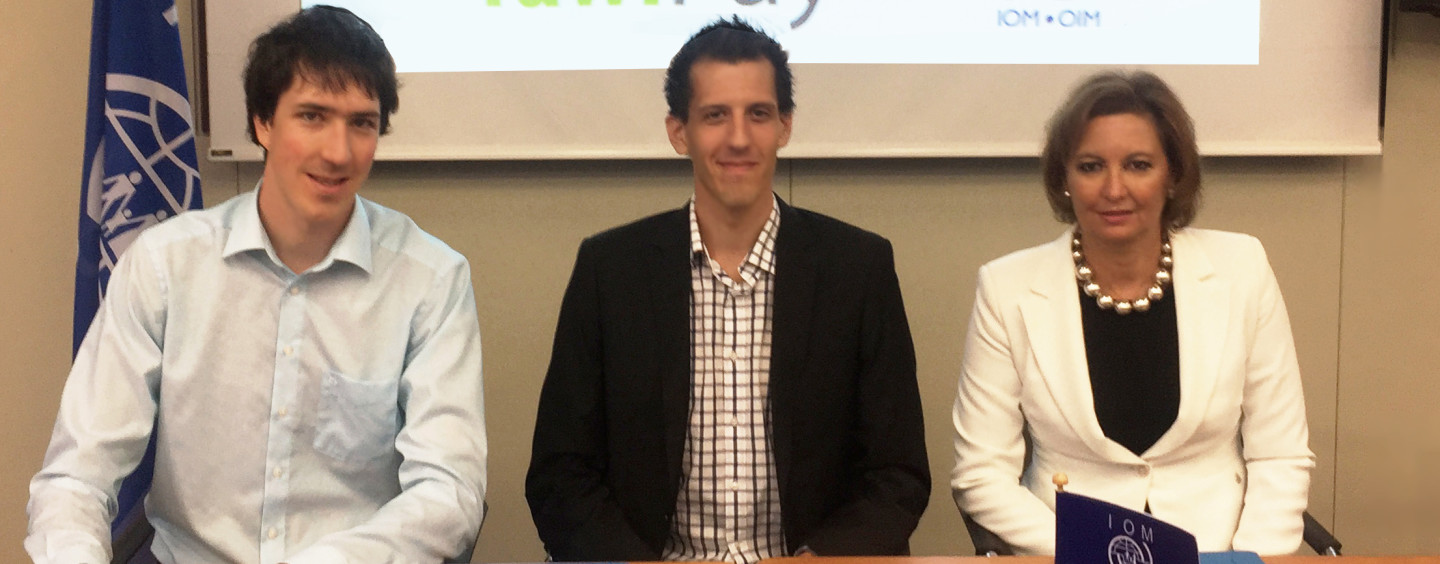
Yacuna Closes Cryptocurrency Trading Platform, Swiss Tawipay Signs Partnership with IOM
by Fintechnews Switzerland October 22, 2015In case you missed these two news: London-based Yacuna will close its cryptocurrency trading platform next month, and Swiss Tawipay has partnered with the International Organization for Migration to work toward the lowering of global remittances costs.
Yacuna to Close Its Cryptocurrency Trading Platform
London-based cryptocurrency trading platform Yacuna has announced that it will close on November 25, inviting users with remaining funds to withdraw their money before that date.
Without citing any further explanation, the company wrote in an announcement:
“Bitcoin is a wonderful technology and we are proud that we have developed one of the first European exchanges for virtual currency. But everything comes to an end. […] We hope that you will continue to be an integral part of the Bitcoin community and support us in our future projects.”
Yacuna said it will manually batch and process withdrawals of all currencies, a process that may take some time it said.
Tawipay Signs Deal with the International Organization for Migration
Tawipay, a Swiss remittances services comparison website, has signed a Memorandum of Understanding with the International Organization for Migration (IOM).
The collaboration marks the debut of a public-private partnership to contribute to the lowering of remittances transaction costs globally and to the monitoring of Sustainable Development Goals (SDG) target 10.c.
SDG target 10.c aims to reduce the costs of migrant remittances to less than 3% by 2030, as well as eliminate remittance corridors with costs higher than 5%.
“This partnership represents what we want to promote as public-private partnership: an alliance that builds on the complementarities of public and private actors and that benefits migrants in the first place,” Ambassador Laura Thompson said in a statement.
François Briod, CEO of TawiPay, said that the partnership is a step forward in his company’s mission to bring transparency and more competition to the remittances market.
“Migrants work hard to send money back home to their relatives, but face hefty charges,” Biord said. “What is needed is information that is not only reliable and up-to-date, but also readily accessible, both for migrants and institutions working to lower the cost of remittances.”
IOM is an intergovernmental organization that works “to help ensure the orderly and humane management of migration, to promote international cooperation on migration issues, to assist in the search for practical solutions to migration problems and to provide humanitarian assistance to migrants in need, be they refugees, displaced persons or other uprooted people.”
Cover image credit: IOM Deputy Director General, Laura Thompson with François and Pascal Briod, TawiPay, IOM.






25 Comments so far
Jump into a conversationI found it to be really insightful and beneficial. I appreciate how you provide insightful information in your writings.
Are you worried because all of a sudden your customer churn rate has started dramatically increasing? If yes, then it is time to revise your customer retention strategy to curb customer leaks immediately.
Get the latest news around the world at News Busters. We cover right-leaning stories and report on liberal bias in the media.
It seemed quite enlightening and useful to me at the same time. I admire the informative knowledge that you present in your article and thank you for doing so.
Your comments in the forum make a lot of sense; I really appreciate your input and hope you’ll keep it coming so we can make webte lol beans even better. In the meantime, thank you very much for sharing your thoughts.
This is really great stuff for an article, this topic is very interesting.
Keep it up with this line of content, thanks for sharing this post!
Thank you for help me in this article, This is good to me ang many .
Thank you very much for working so hard to write such a high quality article. Not a matter of course, thank you.
This a very awesome blog post. We are grateful for your blog post. You will find a lot of approaches after visiting your post
Sad to hear that platform is closed however this could be the start of something new & big as their is always a way to playon.
It’s unfortunate to hear that Yacuna is closing its cryptocurrency trading platform. However, the news of Swiss Tawipay’s partnership with IOM (International Organization for Migration) is an interesting development in the cryptocurrency space. This collaboration may bring new opportunities and innovations to the industry, and we look forward to seeing how it unfolds. Change is a constant in the world of cryptocurrency, and it’s essential to adapt and explore new possibilities.
Suntuk dengan rutinitas di kantor, biasanya dari perusahaan mengadakan acara Tempat Outbound Jogja untuk refreshing dari rutinitas yang ada. Kegiatan ini banyak ditunggu oleh karyawan khususnya yang akrab dengan target pada pekerjaannya. Dengan menyempatkan outbound bersama teman-teman kantor, akan menciptakan suasana yang menyenangkan dan menjalin keakraban dengan rekan kerja
Dengan penyedia jasa Sewa Bus Jogja dengan harga yang murah namun fasilitas mewah. Menyediakan jasa sewa bus Jogja dengan berbagai Kapasitas. Lengkap dengan fasilitas yang sesuai dengan kebutuhan pengguna.
Selain dengan teman kantor, Motivator Jogja Lucu juga bisa dilakukan bersama keluarga pada akhir pekan atau hari libur. Kegiatan ini banyak ditunggu oleh karyawan khususnya yang akrab dengan target pada pekerjaannya.
Di sini Tempat Outbound Kopeng terdapat beragam permainan darat, air, dan udara dengan konsep yang seru dan menyenangkan dilakukan bersama rekan atau keluarga, Kegiatan outbound selain untuk melepaskan penat, juga untuk membentuk mental yang lebih baik.
Paket Wisata Jogja juga cocok dikunjungi oleh keluarga yang memiliki anak kecil. Karena arenanya yang luas maka dapat digunakan untuk anak-anak.
Menyediakan jasa sewa bus Jogja dengan berbagai Kapasitas. Lengkap dengan fasilitas yang sesuai dengan kebutuhan pengguna. Penyedia jasa Rafting Jogja Buruan dengan harga yang murah namun fasilitas mewah.
Fasilitas yang tersedia di sini dapat memenuhi kebutuhan dan keinginan pengunjung. Outbound Bandungan Terbaik juga cocok dikunjungi untuk melepaskan penat, juga untuk membentuk mental yang lebih baik
Kawasan Bandungan memiliki ragam tempat outbound. Salah satunya, Paket Baby Spa Solo Murah yang merupakan incaran para wisatawan ke Jogja.
Banyak cara yang dapat dilakukan untuk memanjakan tubuh agar tetap segar, salah satunya adalah dengan berendam di spa. Pergi ke Spa Bayi Jogja Terbaikadalah salah satu cara untuk memanjakan diri
Ternyata, tak cuma orang dewasa saja yang bisa menikmati perawatan yang memanjakan di spa. Akhir-akhir ini, baby spa atau spa untuk bayi sangatlah marak bermunculan, terutama di kota-kota besar. Jadi, jika Anda tetap berencana untuk memanjakan bayi dengan perawatan spa ini, kunjungi Pijat Bayi Jakarta Termurah
Setelah itu, banyak cara yang dapat dilakukan untuk memanjakan tubuh agar tetap segar, salah satunya adalah dengan berendam di spa. Pergi ke Paket Lengkap Baby Spa Surabaya Terbaik adalah salah satu cara untuk memanjakan diri
I’m thoroughly enjoying this post
تنسيق حفلات في المنزل
Menyediakan jasa sewa bus Jogja dengan berbagai Kapasitas. Lengkap dengan fasilitas yang sesuai dengan kebutuhan pengguna. Penyedia jasa Rafting dumpor Jogja Buruan dengan harga yang murah namun fasilitas mewah.